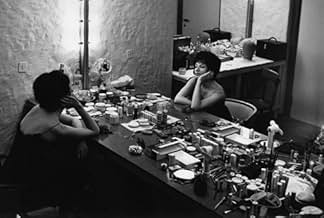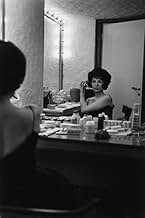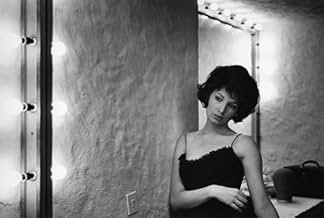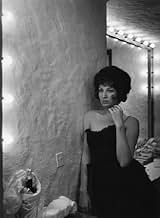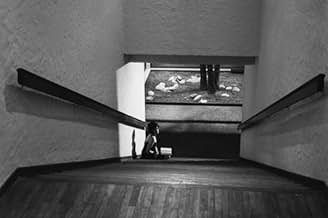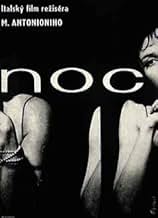A day in the life of an unfaithful married couple and their steadily deteriorating relationship.A day in the life of an unfaithful married couple and their steadily deteriorating relationship.A day in the life of an unfaithful married couple and their steadily deteriorating relationship.
- Awards
- 6 wins & 4 nominations total
- Il signor Fanti
- (as Guido Ajmone Marsan)
- Sé stesso
- (uncredited)
- Un invitato alla festa
- (uncredited)
- Sé stesso
- (uncredited)
Featured reviews
I don't want to get into the plot too much, but this film is more about feeling. The friction and differences between husband and wife are explored.
Antonioni doesn't force anything, he allows a scene to play out in proper time. This film is full of symbolism and despair.
Of course, this film was a product of a time and a place and a sensibility that is now long gone. But be that as it may, this is an excellent film about a married couple who have fallen out of love. OK, no one will be viewing this looking for escapist entertainment. However if you are looking for what the Cinema can do without a blue-screen to enlighten, engross and even (dare I say it) entertain while at the same time shedding some light on human relationships - this film comes highly recommended. Excellent cast too!
With his refinement and cinematic artistry, Antonioni was definitely hitting on all cylinders during the early 60's doing stories that would probably raise a loud 'HUH?' at a Hollywood pitch session - then or now.
While I don't rate this at quite the same level as L'Aventura, this is up there with the best of his films (IMHO).
All of these little, seemingly mundane moments are not all that the film is made up of, and it is in this existential (if it is relatively speaking) crisis for this couple that what real life that's out there and real pains strike up here and there. I loved the moment where Mastroianni is confronted by a seemingly crazy girl at the hospital; is she really crazy, or just desperate for someone's affection or attention (she is later beat into submission by the nurses)? Or when Moreau sees a fight break out with some young men in the less well-off section of town, the hesitation and surprise suddenly throws the fighters off. The party itself- where-in the 'Night' of the title is revealed- has moments of dialog that strike up the symbolic points Antonioni is making. But unlike the director's previous film, the visual-side of the cinematography has its moments but not necessarily as extraordinary in its overall make-up. Yet the initial peaks of interest- both in the actors (particularly Moreau who is always a treasure) and in the final, contemplative act with Monica Vitti, endures with better results.
Maybe the least in the 'trilogy' that Antonioni made between 1960 and 1962, which still makes it more watchable than the usual art-house bores of late. There is almost TOO much room for pondering about these characters, which makes for what could be seen as 'dull', but it really isn't. Detached, maybe, but not hard to connect with if open enough, this is a very good film if not one of the director's best.
"La Notte" is probably the most difficult to watch largely due to the deliberately wooden performances of our 2 protagonists Lidia (Jeanne Moreau) and Giovanni (Marcello Mastroianni). The 2 actors themselves later said that they didn't like the film, and that's probably because their performances were very constrained, emotionless and almost zombie-like throughout most of the film. But this is Antonioni's strategy; he wanted emotions to be internalized by the actors while being externalized by their surroundings.
And that's the key to understanding and enjoying this film. Rather than looking at the actors' faces for cues on how everyone feels, you must look to the settings they're in, the architecture of the buildings through which they pass, and the meticulously arranged decor of the rooms for hints of what's going on in their heads. This is part of the groundbreaking style that Antonioni is famous for in all his films, but it is perhaps the most extreme here in "La Notte".
The plot itself is almost irrelevent, so I won't waste your time talking much on that point. I'll just say it's the story of a mutually dissatisfied couple as we follow them for a 24 hour period. Together as well as individually they pass through extraordinary events (a visit to a dying friend, an extremely bizarre seduction by a mental patient, a walk through a depressed part of town, an encounter with a violent gang fight, and ultimately the bulk of the story at a fantasy-like party full of the Italian elite).
Although the marvelous Monica Vitti appears in this film, she is only a supporting character. Jeanne Moreau is the true center of the story albeit a frustrating one since her face is entirely devoid of emotion the whole time. This contrasts against the profound sadness and chaos we gather she must be feeling inside but doesn't show.
If you prefer your films with more of a human element, I would say definitely start with the Monica Vitti films (L'avventura and L'eclisse) where she has a way of projecting tremendous emotion even without moving a muscle on her face. "La Notte" is more of a display of fantastic visuals and stunning mise en scène rather than any acting theatrics.
Did you know
- TriviaThis movie is considered the central film of a trilogy of alienation or unofficial "Incommunicability Trilogy" beginning with L'avventura (1960) and ending with L'éclipse (1962).
- GoofsWhen Giovanni pours champagne in the hospital, Bernhard Wicki (Tommaso) looks straight into the camera while turning his head from Lidia to Giovanni.
- Quotes
Lidia: [reading from a piece of paper] "When I awoke this morning, you were still asleep. As I slowly emerged from my slumber, I heard your gentle breathing and through the wisps of hair over your face I saw your closed eyes and I could barely contain my emotion. I wanted to cry out, to wake you up, because you slept so deeply, you almost seemed lifeless. In the half light, the skin of your arms and throat appeared so vibrant, so warm and dry that I longed to press my lips against it, but the thought of disturbing your sleep, of you awake in my arms again, held me back. I preferred you like this, something on one could take from me bacause it was mine alone - - this image of you that would be everlasting. Beyond your face I saw my own reflection in a vision that was pure and deep. I saw you in a dimension that encompassed all the times of my life, all the years to come, even the years past as I was preparing to meet you. That was the little miracle of this waking moment: to feel for the first time that you were and always would be mine and that this night would go on forever with you beside me, - with the warmth of your blood, your thoughts, and your will mixed with mine. At that moment, I realized how much I loved you, Lidia, and the intensity of the emotion was such that tears welled up in my eyes. For I felt that this must never end, that all our lives should be like an echo of this dawn, with you no belonging to me but actually a part of me, something breathing within me that could could ever destroy except the apathy of habit, which is the only threat I see. Then you awoke and with a sleepy smile, kissed me, and I felt there was nothing to fear that we'd always be as we were at that moment, bound by something stronger than time and habit."
- ConnectionsFeatured in Cinq colonnes à la une: Episode dated 1 December 1961 (1961)
- How long is La Notte?Powered by Alexa
Details
Box office
- Gross US & Canada
- $39,236
- Opening weekend US & Canada
- $10,547
- Sep 18, 2016
- Gross worldwide
- $40,703
- Runtime2 hours 2 minutes
- Color
- Aspect ratio
- 1.85 : 1
Contribute to this page




